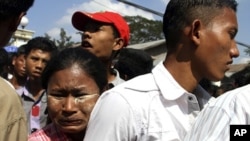The United States, for the first time in two decades, announced Friday that it will post an ambassador to Burma, which earlier in the day freed hundreds of political prisoners. A series of reforms in Burma has prompted Washington to change how it deals with the country.
U.S. President Barack Obama calls Burma's decision to release hundreds of political prisoners "a substantial step forward for democratic reform."
The Burmese government freed 651 prisoners on Friday. The release is in line with conditions for improving relations with Washington that U.S. Secretary of State Hillary Clinton made clear during a visit last month.
Following the prisoner release, Clinton said on Friday that the U.S. will start the process of exchanging ambassadors with Burma.
"As I said last December, the United States will meet action with action. Based on the steps taken so far, we will now begin," she said.
But Obama and Clinton both said that more political reforms need to happen in Burma.
Clinton says Washington will continue to urge Burma’s government to take “bold steps” to build a free and prosperous nation.
Washington withdrew its ambassador more than 20 years ago, after the military council ruling Burma at the time ignored the results of the opposition’s overwhelming victory in the 1990 election.
The U.S. and many other governments, including the European Union, have long imposed economic and travel sanctions on Burma, considered one of the most repressive nations in the world.
An election in 2010 brought in a civilian government, although one backed by the military.
That new government has made several reforms, including easing media restrictions and allowing greater civil liberties.
Photo Gallery: Burma prisoner release
This week the government also signed a ceasefire with the ethnic minority Karen rebels.
In addition, Burma’s government is allowing opposition leader Aung San Suu Kyi to run for parliament April 1. Aung San Suu Kyi, the head of the National League for Democracy, has spent most of the past 22 years jailed or under house arrest.
Burma hopes the prisoner release and the peace deal will help improve relations with the international community.
David Mathieson, with Human Rights Watch, says the release is important.
"You're talking about quite a comprehensive list of prominent political activists, journalists, labor activists, Buddhist monks and former members of the government," he said. "So this is really quite a significant release."
United Nations Secretary-General Ban Ki-moon welcomed the prisoner release and the cease-fire with the rebels. He said he hoped the freed political activists will be able to contribute to national reconciliation.




